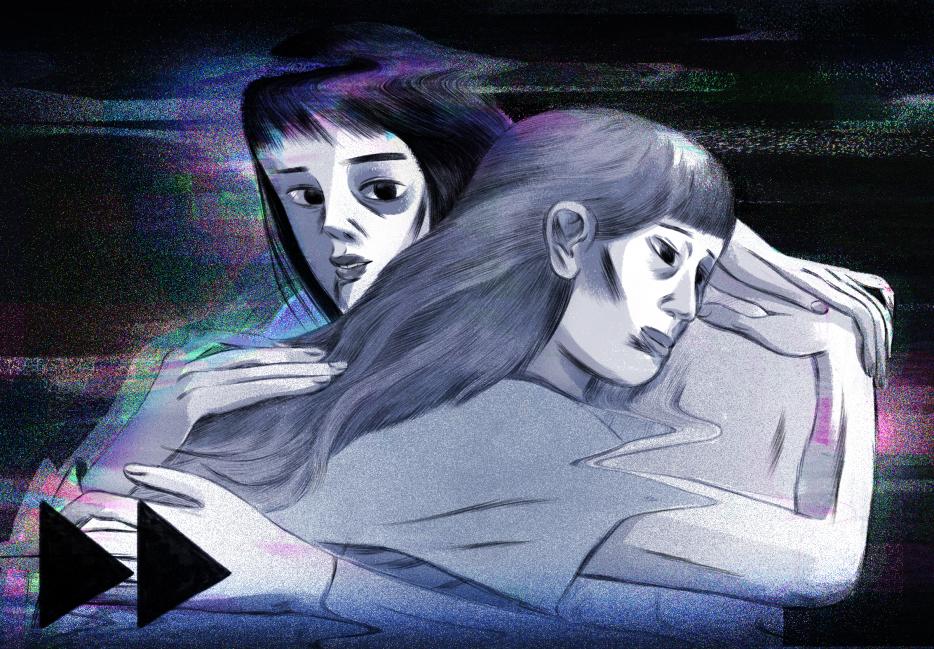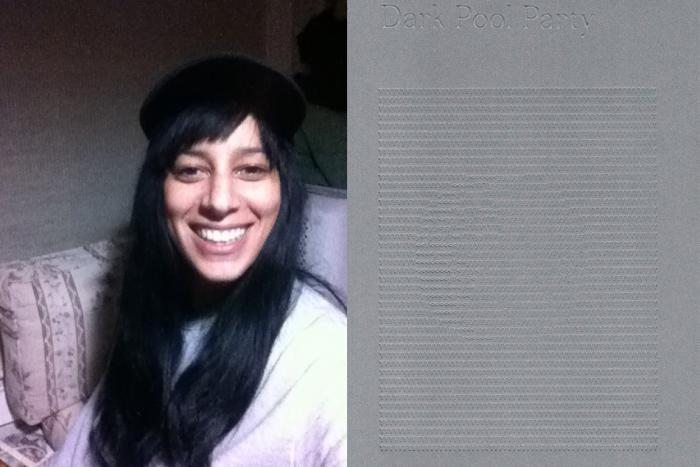I was not prepared for the possibility of my sister. She was born in that in between time—the days before summer vacation has started and all the possibilities are still alive, waiting. I was jealous. After seven years, 11 months and one day, I had unwillingly ceased to be an only child. On the car ride to the hospital, I vowed not to hold her. That sentiment stuck. Maybe I would have changed my mind if she were soft and sweet, delicate as a ballet slipper, like the babies I’d seen in movies. But she was none of those things. She was a sound: squalling—with a tiny face wide at the mouth, bunched into wrinkles everywhere else. I watched her hiccup for breath, her wrinkled skin gone neon, bright as a Barbie shoe. There’s a picture of me from that day, standing over her, my head topped with a floppy mullet, soft stomach jutting out. The puzzled look on my face says, who are you?
Or, rather: Who are you to me?
It was a long time before anyone realized there was something not the same about her. She first had to grow old enough to compare. For us to see that she was still crawling, while the other toddlers on our sleepy suburban street had learned to walk. Unsteady, but upright. She said few words, rarely strung together. Outside, in the summer, she tried to keep up with the neighbourhood kids—giggling bundles of gawky angles, bruises and scraped shins—but couldn’t. Our family doctor ordered tests. There were assessments, a word I didn’t quite understand. It suggested a definition, but I didn’t know yet that you could define a person—that you could want to fix them, to decide different like her meant broken. After the results were delivered, she became affixed with the label “developmentally handicapped.” Like she was a jar, a shirt, boxes that you organize in a closet.
A diagnosis is meant to give a reason. We can say, look, you have cancer. That is why you are feeling so unwell. You have depression. That is why you are so sad. You have this, so you are that. We expect a direct correlation, a cause, a salve to soothe us against all the things in the world that don’t make sense. The things that hurt us. A diagnosis tells us if A, then B. In this way, we define and we mend and we neatly slot the world into order. A diagnosis of disability tells the world where to fit a person, what they can and cannot do, how they will be loved and love in return. It designates relationships and builds hierarchies. From the moment my sister was diagnosed, people expected it would define us, too. Her and me. When they spoke they left so much room for the wrong words, such as caretaker and burden and problem, but too little for the right ones, such as sister and friend.
They all answered the question I had at the hospital for me, wouldn’t listen when I told them they were wrong.
*
The word retarded is Latin in origin. Retardare means “to make slow, delay, keep back, or hinder.” The first time it was used in reference to intellectual disability was 1895. Not yet a pejorative, “mentally retarded” was considered a kinder, more precise term, meant to replace previous iterations—idiot, moron, and imbecile. Other terms, also meant to be neutral, were “subnormals” and “mentally defective.” Ability within that realm was divided into “high grade” and “low grade.” By the 1940s, those subclasses became three: educable, trainable and custodial. An educable person could be taught academic skills, like reading and writing. Trainable meant a person could learn—well, be trained in—life skills, such as how to tie their shoes and brush their teeth. Custodial meant a person needed care, institutionalization.
Today’s accounts scrub these terms clean with clinical politeness, a doctor breaking bad news. Say things like, “A person who was custodial generally received very limited developmental opportunities.” Trust we won’t think of the word custodial and its split definitions: having the responsibility for taking care of a child and also involving punishment that requires a criminal to spend time in a prison. Trust we won’t know. I wonder if those authors are right. If that’s why I’m sometimes the only one in a room who hears the word “retard” and cringes, goes hot and cold inside, a flickering thermostat, body on the fritz. If it’s because I’m the only one who’s held their sobbing kid sister, tears mapping down her face, while she asked what it meant, that word those kids on the street and in the school hallways called her. Me, who couldn’t find a way to say it. To nod all those times she asked if it meant her.
*
I call my sister Kiddo. When I was in Grade 8, she started kindergarten at the same school as me. The teacher didn’t think much of her—she worried at Kiddo’s diagnosis, was sure that she would never count past 10, that she couldn’t be taught anything. One day, she locked Kiddo in the kindergarten washroom and forgot about her for an hour. When they finally went to her, Kiddo’s face was pale like Styrofoam and even her shirt was damp with salty sweat and, I think, tears. At home, we would never, ever lock the bathroom door again. The next year, Kiddo transferred schools, then transferred again, finally enrolling in an expensive private school for “special children.” She learned to count to 100, then higher still.
During this time, Kiddo and I formed the big-sister, little-sister relationship familiar to so many siblings. Meaning, I thought I knew everything and was delighted when Kiddo sometimes agreed. I complained loudly to my parents that she wouldn’t leave me alone, but secretly ached for her to look up to me. In the summer, we settled into the milieu of 1990s suburbia: every day we walked our dog, a black lab named Bruno; then played barefoot tag in circles; spent hours at the park behind our house; coloured landscapes of crescent birds and pointy suns; sang in a way that was more like shouting. We watched a lot of TV. Kiddo fast-forwarded to the parts she liked and skipped the rest.
Of course, one day, the VCR broke. We found dozens of Kiddo’s tiny toys jammed into its geared depths. They were mostly melted. A wad of fluorescent plastic. Nobody saw her do it, and none of us could figure out how she didn’t get her hand stuck inside. It didn’t matter: the VCR was done, kaput. (This did not lead to my parents buying a DVD player, a new technology they mistrusted would catch on. Ditto computers. Ditto everything actually cool.) When they told Kiddo, who by then had switched to watching Teenage Mutant Ninja Turtles 2 on repeat, she mimicked Raphael’s most dramatic scene, yelling “Damnit!” at the top of her lungs. My parents were shocked, but I laughed and laughed and laughed.
*
In 1914, the U.S. formed the Committee on Provision for the Feeble-Minded. Headquartered in Philadelphia, PA., the committee placed satellites throughout the country, staffed with so-called intelligent men who I imagine steepled their fingers and said hmmm a lot, all banded under one objective: To disseminate knowledge concerning the extent and menace of feeble-mindedness and to suggest and initiate methods for its control and ultimate eradication of the American people. In New Jersey, the committee summarized “The Problem” of its “helpless, but dangerous class” as such: “They must be prevented from procreating, for their defects are known to be heritable and their numbers tend to multiply.” Like bunnies or mold.
The solution was to create work colonies. In the committee’s words: “To clear the land for farming purposes means work of a character that does not appeal to the normal citizen, but for the feeble-minded boy-man it is a joy.” A joy. These stuffy self-proclaimed arbitrators of destiny and choice decreed work colonies a win-win. The “waste product of humanity” could be put to good use, they wrote, toiling without pay, rendering overgrown strips of land, brushed with oak and pine and pitted with swaps, into farmland. Readying it into a place with a sellable slogan: The Garden Spot of a Nation.
Does this sound naïve to you? This expectation that you’ll understand my sister is my sister?
Grainy, colourless photos of the colonies show men in high pants and suspenders clearing roads, laying cement blocks, hoeing fields of sweet potatoes. There is a swimming hole that’s supposed to be idyllic, looking-glass water hemmed in by low trees, but to me it feels eerie. It all does. These places of mandated paradise were prisons. These places where men go to have blank faces and others see and say, Oh, that expression must be happiness. Because that is what they’ve decided.
When people ask me what developmentally handicapped means, I choose my words carefully, delicately. I am a dancer pirouetting over landmines. A seamstress threading sequins on a bomb. I tell people that it means that my sister’s developmental skills do not always reflect her age. That her reading, writing and motor skills can develop at a slower rate than others’—that some may not catch up. That it means she writes in block letters and reads, but not novels. Picture books. But I never linger. I try instead to tell them who she is: stories about growing up together, broken VCRs, that time she once told her teacher, with confidence, that all she knew about Jesus was that he was dead and it was probably cancer that killed him.
Because not much time at all has passed from those work camps to now. We think yes, but a lifetime of conversations tells me no. We could accordion in yesterday to today. Smoosh inside an urge to define and fix, to sweep people under rugs like detritus. To decide for ourselves who they are and all they can be.
*
Kiddo and I do this thing where we press our thumbs together and declare, “best sisters.” It means that it is us against the world. In modern parlance, that she is my ride or die, though neither of us can drive or even ride our bikes very well. It means that I took the day off work to help her get ready for her prom, told her a thousand times that she looked beautiful. It means that when I moved to Yellowknife for a job, we talked on the phone almost every day for three years. It means that I taught her how to make cookies and bagels and pancakes and she taught me how to five-pin bowl and to not suck so much at Wii. It means that we have a pact to eat an inhuman amount of junk food and thrift ridiculous T-shirts at every sleepover. That I’ve coached sports I don’t play very well, attended dances and banquets, cheered from the sidelines.
It means that one time, she invited her high school crush over when neither of them knew I was home, working in our basement office, and that when he tried to pressure her into watching porn and doing things, I scared him so much I thought he would shit his pants. Went toe-to-toe, became a mafia enforcer, taught him about RESPECT. That the next day at school, he told her I was terrifying and that he would never try to make her do those things again if she didn’t want. That when I asked her how she felt about that, she said, “Good.” That we talked about how those things are fun when you want to do them. When you’re ready. And that when she was, we went on double dates and talked about all the nice guys and the jerks and how sometimes you cannot tell who is who. That if I could I would protect her from all the awful things in the world, not because she needs it, but because she is the person I care about most.
It means that I cannot describe to you what love is. That I could try with beautiful metaphors and similes and imagery, but it’s just what happens when you press your thumbs together and say, “best sisters.” And all the other moments in between.
*
In late 2015, The Mighty, a website with the tagline “we face disability, disease and mental illness together,” took down a story called “Introducing: Meltdown Bingo.” In a subsequent post on the article’s removal, the site’s editor acknowledged the post was meant to be funny—a lighthearted take on common consequences of an autism meltdown—but missed the mark. The site was called ableist, and called out for disability shaming: its focus on the mother’s distress, not the child’s—its portrayal of a person as a burden. It wasn’t the first time The Mighty was nailed for its tone and approach. Many writers and activists with disabilities have rightfully criticized the site for leaning toward stories written by parents of children with disabilities, with many of the articles falling into “inspiration porn” territory. As in: look at how we’ve overcome. As in: our story of resilience will brighten your day. As in: here’s your next Tumblr meme.
The controversy spawned the hashtag #CrippingTheMighty and a set of resolutions for better coverage of disabilities, including promising to hire more writers and editors with disabilities. These are good, necessary conversations. There’s a tendency to treat disabilities like they’re one-size-fits-all shirts. It’s true there are many people who are unable to advocate for themselves, who need allies to help speak up for their rights. But I’m always surprised when I introduce Kiddo to friends and colleagues who’ve never met her and they fumble through the conversation, talking to me as if I’m her translator. I have to remember they didn’t grow up in these communities, that so many people only knew those with intellectual disabilities as the kids in the sequestered special classes or from movies like Rain Man or What’s Eating Gilbert Grape? or, oh god, The Ringer—if they knew them at all. Is that even an excuse any more?
The more we can break down those assumptions and stereotypes, the better. That a huge part of that is creating platforms for people with disabilities to voice their own lived experiences—to advocate for themselves—seems obvious to me. I do wonder, though, if these movements politicize the personal. If, on some level, they sacrifice the idea that relationships are complex, that we can express care without being caretakers.
*
The word caregiver has interesting origins. It started out as caretaker—a word that seems to accept the countless ways caring can take from a person. I know it’s more likely a nod to the idea of “taking care of,” but there’s something to be said for the way the word doesn’t hide. It was first included in the Oxford English Dictionary in the mid-19th century as “one who takes care of a thing, place, or person; one put in charge of anything.” The first recorded use was in 1858 to describe a mother who acted as a nurse to her daughter and a “servant” to her husband, allowing us to guess at the word’s knotted beginnings of self-sacrifice, duty and expectation. The word caregiver waited a century to make its way into the vernacular, arriving in the mid-1960s via the U.S. book The Meaning of Mental Illness to Caregivers and Mental Health Agents. The definition: “a person, typically either a professional or close relative, who looks after a child, elderly person, invalid, etc.” (Now the OED uses the word “disabled,” but not much else about the entry has shifted.)
Even after “care” got its new, kinder appendage, the word caretaker persisted throughout the ’70s and ’80s. There are newspaper articles from the late ’80s that wonder over the new, presumably faddish P.C. adoption of “caregiver.” My Webster’s family dictionary, copyright 1977, for instance, is a red-canvas, gold-embossed dignified tome, a book whose weight and age have split its pages from the spine. It doesn’t include the word “caregiver,” only taker—physical evidence that past perceptions stick. Many of those who care for other people, family and professionals both, prefer the term caregiver. Probably because it lacks the gross connotation of physical objects, and people are not meant to be objects that burden us. Nor property to which we owe janitorial duty.
Even “caregiver” is now ceding to carer. I like the word carer. Its simple and maybe a bit meaningless, but in a way that I think is good. A way that’s universal and also more truthful. A way that gets us closer to the word care, the pared down synonym for all our closest and best relationships.
What people can never understand is that Kiddo takes care of me, too. When I say this, they expect stories of inspiration—the types of life lessons critics of The Mighty so loudly derided. I hear things like, She must have taught you to be a better person. Or, She must really put life in perspective, huh? She must show you how much you have to be grateful for every day. She must have taught you patience and tolerance and humility. I mean, sure, human relationships can teach us many things. And, I know these comments are meant to be kind, but they rankle. They’re not kind; they reinforce Chicken Soup for the Soul popular bullshit thinking that reduces her down to a person who can only exist as a cosmic life lesson—they rob her agency, her purpose, and give them to me. They’re just as bad as the ones I get when I tell people we spent the weekend together for a Girl’s Night. Like, It must be tough to take care of her and Sorry you had to spend your weekend doing that. Or, What do you even do together all that time? I’m tired of patiently explaining that we’re sisters, so that’s what we did: sister stuff.
Does this sound naïve to you? This expectation that you’ll understand my sister is my sister? If I know the person—and often I do—I’ll take a deep breath and try to explain. I’ll tell them about how, when I broke my leg, she visited every other weekend with an armful of cheesy movies, made me popcorn and climbed into bed next to me, laughing at how dopey I was on painkillers. That every time I’ve had to move apartments, she’s there with a mop and packing tape. That we chat about boyfriends and how much our mom annoys us sometimes as we fill cardboard box after cardboard box. I’ll say that of course she was my maid of honour when I got married—even though so many people tried to dissuade me, wondered if I didn’t want someone more “capable.” That she walked down the aisle in a bad-ass suit covered in skulls, her hair four inches high in spikes. Her speech thanked me for coming to her hockey practices and praised my baking skills. I’ll tell them how I called her three years later, sobbing, when my husband left me and she gave me the best, sagest advice: “You know what Lauren? A cat is better than a husband.”
*
I stayed with my sister recently, at my parent’s house, where she still lives. My mom was out of town, visiting our dying grandfather. It was an epic 10-day Girls' Night. She made me dinner when I had to work late, made sure the tea was on when I had to work later still. Every few nights, we visited Shoppers Drug Mart, spritzed ourselves with expensive perfume, pretended we were rich before walking a few aisles over and buying Skittles. At the end of it, she drew me a picture of our new apartment. She gave me a large room, labeled “room,” and excellent hair, labeled “hair.”
There was a time when I thought my sister and I would move in together. That I would, in fact, take custody of her. I couldn’t stand the thought of her moving out of my parents’ house and into a group home—the horror stories I’d heard about exploitation, violence, abuse. I wanted her there, with me, because she’s my best friend, but also because—let’s just cut past the red-cheeked shame and admit it—I was guilty of ableist thinking too. I assumed she needed me in a way that she doesn’t. I presumed that need was eternal, that it trumped her independence. That she’d want me there as much as I wanted to be there.
During those 10 days, I learned that Kiddo had discovered the term “special needs.” I’d never heard her say it before—wasn’t aware that she knew the world had given her a label and expected her to abide by it. Well, I’m still not sure she thinks that. When I asked what she meant, she responded that’s what she was, special needs. That some people have autism and some people have Down Syndrome and some people have other things. That her friends were special needs too. Then she asked me what my disability was. And what my friends’ disabilities were. When I was unsure how to answer, reluctant to categorize myself as other than her, she told me it was okay, I probably had autism. Then she asked if I wanted to eat popcorn and watch a movie. She turned on The Sandlot, fast-forwarded to the good parts.






